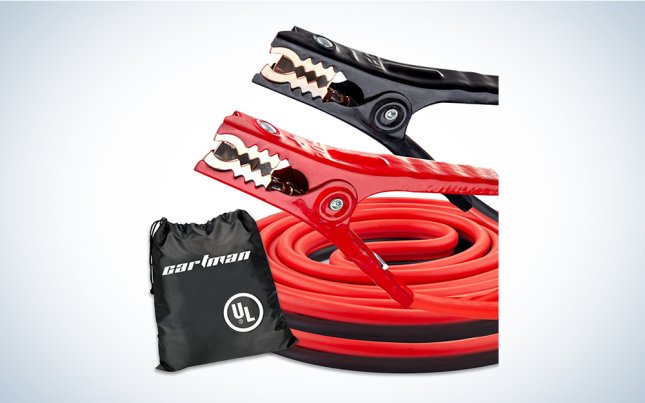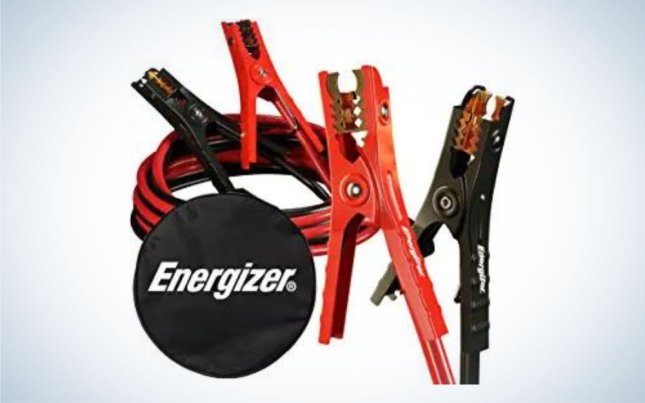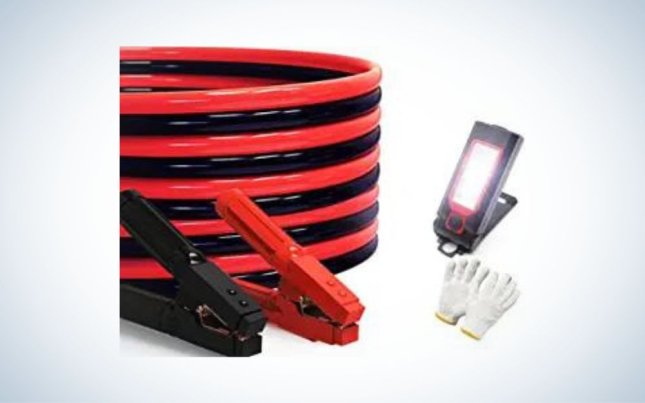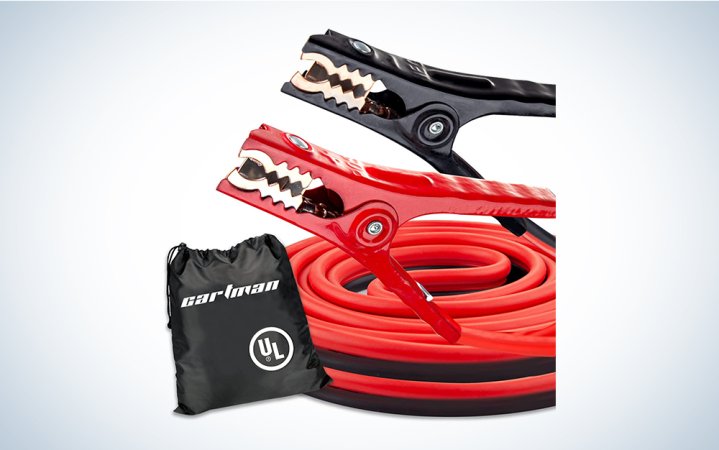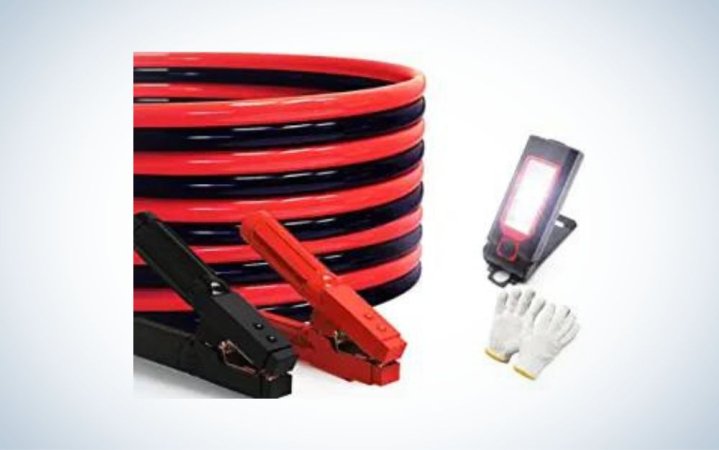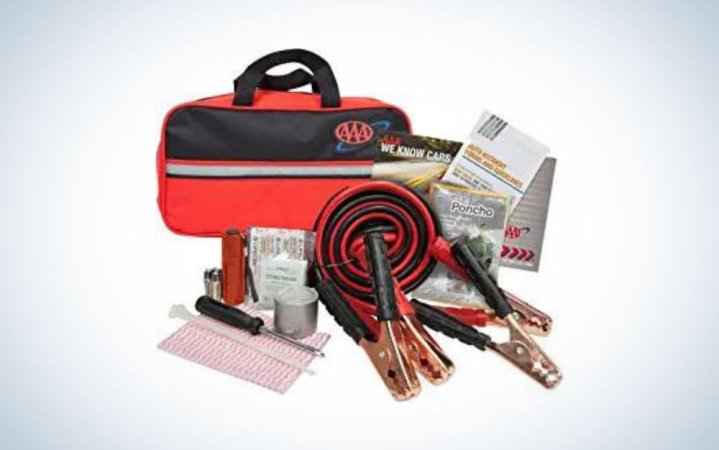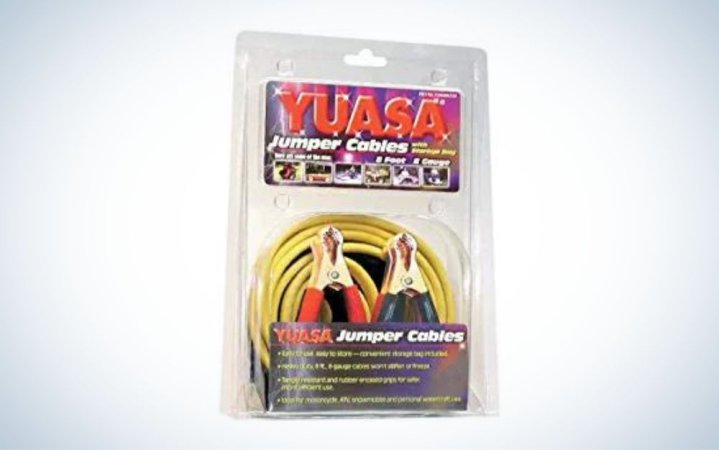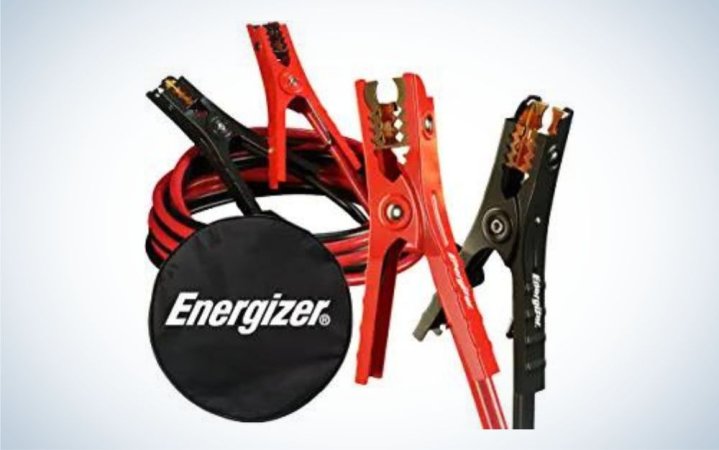We may earn revenue from the products available on this page and participate in affiliate programs. Learn more ›

Jumper cables may be the perfect example of a tool that you’d want to have and not need rather than need and not have. Though most of us can often go years in between using them, jumper cables are an indisputably invaluable tool that uses the electrical energy from another car to jump-start a weak or completely flat battery in another vehicle. The telltale “click click click” of a starter is a sure sign you may need a “jump” to get going. Though some good samaritans might carry jumper cables, it’s usually easiest to carry a set yourself and not rely on chance when you may be stranded. This list of the best jumper cables will help you get the right tool for your specific needs.
- Best overall: CARTMAN 4 Gauge 20 Feet Jumper Cables
- Best heavy-duty: AUTOGEN Heavy-Duty Jumper Cables
- Best portable: Lifeline AAA Premium Road Kit
- Best for motorcycles: Yuasa Jumper Cables
- Best budget: Energizer Jumper Cables
How we chose the best jumper cables
I’ve used more than a few sets of jumper cables in my life, and one particular set quite a few times when I owned a Square Body Chevy. My personal affinity for older—arguably, poorly maintained—project cars has led me to have plenty of personal experience jumping different vehicles in a variety of parking locations. That being said, I’ve made selections that reflect a balance of my personal experience alongside products that have been favorably reviewed online. You want to buy as much length and cable size as your budget can afford, and these picks definitely reflect that mantra. Additionally, though spending a fortune isn’t necessary, you want to buy some that are rated for the kinds of conditions you may encounter, especially on the colder side, since cold weather often takes the highest toll on a car’s starting system. Each pick in this guide would be a good choice, but some—like the motorcycle options—are going to be best for a powersports application. These selections were made at the nexus of length and cable size, as well as construction and temperature ratings, which means they should serve you well no matter the type of weather you encounter.
The best jumper cables: Reviews & Recommendations
Best overall: CARTMAN 4 Gauge 20 Feet Jumper Cables
Best Overall
Why it made the cut: These versatile jumper cables are a wonderful intersection of value, just-right capacity, more than enough length for most situations, and are rated to -13°F.
Specs
- Weight: 5 lbs
- Length: 20 feet
- Gauge: 4 gauge
Pros
- Rated up to a 6.0L gas engine
- Enough length means less vehicle maneuvering
- Rated to remain flexible down to -13°F
Cons
- 4 gauge not suitable for biggest engines
- Unique tooth shape might be challenging on some cars
These cables meet right at the intersection of value and capability. The 20-foot length means you can pull up alongside just about any other vehicle and not worry if you’ve got the cars positioned close enough. Sure, 8- to 10-foot-long cables take up less space, but it’s convenient to have more when these things happen.
Next, that handy rating down to -13°F means these should remain flexible for any of the nasty inclement weather you encounter. I’ve worked outside in -20°F and, let me tell you, there are a lot of things that just aren’t “rated” for cold weather and it shows when you go to use them.
The only downsides I can think of for this might be the fact that 4-gauge wiring just may not be heavy-duty enough for your application (see my heavy-duty choice instead) or that those unique teeth might actually hinder more than they help in some cases. The clamps have a unique design that combines a traditional jumper cable clamp with a slightly longer protruding portion. It looks like it’s perfect for the right vehicle, but the elongated section might just make it a bit harder to get a nice sturdy connection on some vehicles. Give ’em a dry run and practice hooking them up when the pressure is off.
Best heavy-duty: AUTOGEN Heavy-Duty Jumper Cables
Best Heavy Duty
Why it made the cut: Remember, lower is thicker when we’re talking about gauge, so these 25-foot-long 0-gauge jumper cables earned the top spot for heavy-duty applications.
Specs
- Weight: 12.6 lbs
- Length: 25 feet
- Gauge: 0 gauge
Pros
- 0 gauge suitable for jumping RVs and big trucks
- 25 feet enough length to make hookup a cinch
- Cable and coating rated down to -40 F
Cons
- At 12.6 pounds, these aren’t small
- That much copper isn’t cheap
Now, we’ve been through a good overall that will suit most drivers, but what about the guy—or gal—driving a big diesel and needing to jump-start heavy equipment from time to time? I bring you the AUTOGEN Heavy Duty 0-gauge jumper cables. These are the heaviest cables I could find outside of getting deep into triple-digit prices.
The trouble when you’re working with big batteries, lots of amperage, and small cables is heat management. Or a lack of it. If you hook up a big battery that can push out a lot of amperage to smaller cables they could get hot. Really hot. And they can fail. The amount of power needed to turn an engine over and start it is tremendous, and even more so on larger and more powerful engines. If you’re driving or will be jump-starting a large RV or heavy equipment, 1- or 0-gauge cables are a smart choice.
The only con to heavy-duty cables is the corresponding weight increase. My budget pick weighs in at a paltry 2 pounds, while these heavy-duty jumper cables weigh in at more than 12.5 pounds! They’re bigger and longer than the others—and more expensive too—but when you’re dealing with heavy equipment, the tools do get bigger.
Best portable: Lifeline AAA Premium Road Kit
Best Portable
Why it made the cut: When you’re talking about portability, a carrying case is good, but having a few extra bits can make the difference when you really do need to use them for a jump.
Specs
- Weight: 2.6 lbs
- Length: 8 feet
- Gauge: 8 gauge
Pros
- Kit designed with emergencies in mind
- Just enough length on the jumper cables to be useful
- Extras that can help in an emergency
Cons
- With just 8-foot cables, your cars will have to be positioned perfectly
- A 42-piece kit might be more than you’re looking for if you have the other 41 pieces already
For years the American Automobile Association (AAA) has been helping motorists with their maps, roadside assistance services, and curated emergency car kits. At least, that’s how it looks to me. I’ve used their towing services a few times and was a member for years, so when I came across their Premium Road Kit it seemed like the perfect way to take jumper cables and make them portable. Though jumper cables are generally a fairly lightweight tool, they aren’t always the easiest to leave in the corner of your trunk. The cables can become tangled and the alligator clamps can snag on other items, making them a bit of a nuisance. Though many come with a storage bag, something like this kit can really keep things neat and tidy until they’re needed. Just make sure to open it up and get familiar with the contents before it’s dark and rainy and you’re trying to find out which pocket the flashlight batteries got off to.
The only downsides to a 42-piece kit, especially when we’re talking just about jumper cables, are if you don’t happen to need the other 41 pieces. If you don’t, then you might be best served buying a small storage bag and a cheaper (longer) set of jumper cables and making your own portable bag. Though the 8-foot-long cables in this kit will get the job done for most small-to-midsize vehicles, you won’t have much extra room to work with, so vehicle positioning is key.
Best for motorcycles: Yuasa Jumper Cables
Best for Motorcycles
Why it made the cut: The idea behind these motorcycle jumper cables is simple: like motorcycle batteries, take what you know and make it smaller.
Specs
- Weight: 1 lb
- Length: 8 foot
- Gauge: 8 gauge
Pros
- Smaller clamps are perfect for fitting onto small battery terminals
- Compact enough to stow in saddle bags or on bike
Cons
- Short length and smaller diameter not suitable for cars
- Some reviewers didn’t get the storage bag
Though you can probably get by with automotive jumper cables to jump-start your motorcycle, there’s a good chance the big chunky clamps will be too big to fit in and connect to your bike’s battery for a jump start. That’s why Yuasa, among others, sells a compact set of jumper cables designed specifically for motorcycles. These cables are the perfect size to slip in and clamp onto a motorcycle’s battery terminal without coming loose. On most of the bikes that I’ve had the battery lived beneath the seat, and the terminals were so close to the sides of the battery box they would have been impossible to get a traditional automotive jumper cable onto.
The only downside I noticed for these is that some of the reviewers didn’t get the storage bag that’s advertised with these jumper cables. Instead of a loose pair of cables getting hung up on all your stuff in your saddle bag a storage bag is really handy, so make sure yours comes with what’s advertised as well.
Best budget: Energizer Jumper Cables
Best Budget
Why it made the cut: Sometimes you’re on a budget, and that’s okay! What’s not okay, however, is having to compromise unnecessarily. These sell for less than $20, are long enough to do the job, and are thick enough for most cars and small SUVs.
Specs
- Weight: 2 lbs
- Length: 12 feet
- Gauge: 10 gauge
Pros
- 10 gauge should be enough for cars, small SUVs
- Just enough length to not be a pain to hook up
- Rated down to -40 F
Cons
- 10 gauge not suitable for larger vehicles
- 12 feet may require some maneuvering to get hooked up
Sometimes it can be hard to justify spending $50 or more on something you might need, so you start looking cheaper. Honestly, a lot of the cables in this guide are less than $50, but they’re well worth the investment. The Energizer 12-foot 10-gauge jumper cables are about the smallest, and shortest, you’ll want to get, and they’re right in line with the price of even shorter cables. Now, they do offer these in different lengths and gauges, so if you’re looking for the absolute best deal you can get, make sure you size these (gauge/thickness) for your particular use. If you’re driving around an old Square Body Chevy truck like I was and needing a jump far too often, then 10 gauge is not going to be enough. But, if you drive a 10-year-old compact Honda or Toyota sedan, then these will stow nicely in the corner of the trunk for a day they’re needed. That, and the -40 F flexibility rating, are what cinched the recommendation from me since the AmazonBasics ones in this size/capacity did not carry that rating.
All that being said, 12 feet sure can feel pretty short if you find yourself parked head-first in a spot with no room to bring a car alongside you. For the majority of situations, it’s plenty, but if you know you have a problem and aren’t able to address it right away—hey, I’ve been there too—then park accordingly, with the engine bay toward the driving lane if possible.
Things to consider before buying jumper cables
Jumper cables have been around for years and, as such, the vast majority of them are incredibly simple devices. There have been some recent advances in the space in the form of jump packs, which are small battery packs—similar to the type you’d use to charge a phone that’s low on juice—that have a pair of the distinctive alligator clips hanging off the end to attach to your car’s charging system. Though you can get a simple set of jumper cables for around $15, getting a quality jump pack will often run you $100 or more. These devices truly do a good job but, for some, the cost can be hard to get over, so a traditional set of jumper cables will do just as well, just add another helpful driver.
Use caution
Remember when I said that jumper cables are simple devices? Well, unlike many of the systems that have been improved over time to be safer than ever, applying 12 volts of power directly into the engine bay of a car can be done incorrectly. Anyone who’s ever done the task can likely tell you about accidentally throwing a few sparks when they inadvertently touched the red clamp against a piece of bare metal in the engine bay, which completes the circuit and allows electricity to flow from the running vehicle through whatever it’s now touching. If this happens to be sensitive automotive electrical components, or if you wire the system up “backwards” with the positive and negative sides switched, some serious damage can happen. That being said, if done properly, jump-starting a car can be a drama-free experience that gets you on your way quickly and without too much fuss.
Shop for what you’ll encounter
When you start shopping for jumper cables you’re going to notice that there are lots of options, each with its own advantages. The only notable disadvantage is going to be cost and portability. Not everyone has enough room for 30 feet of 1-gauge jumper cables that’ll safely carry enough current to jump-start a big truck. Then again, the cheapest 10-foot jumper cables you can buy online may not be adequate if you drive a midsize SUV, or truck either. The other factor to consider is what sorts of weather the cables are rated to. Some of the picks are rated to remain flexible—and, thus, useful—down to -40 F, while others would freeze and possibly crack when unrolled after your car fails to start on an icy morning. This doesn’t necessarily mean one set is better than another—because many people will never encounter temperatures well below zero—but it just means that you should think about what you’re likely to encounter and buy accordingly.
Longer can be more convenient
When you get a set of jumper cables, the biggest two drivers of cost are the thickness of the cables themselves and their length. The lower the gauge, the thicker the cables are: the 1-gauge heavy-duty cables can handle enough current to jump-start a big truck, while an 8-gauge set might be smaller and easier to handle, it would only be best for jump-starting a compact car or small SUV.
Jumper cables also come in a wide variety of lengths, from eight feet, all the way up to 30 feet and likely beyond. The longer ones take up more space, but if you find yourself with a shorter pair (like I have many times) then you often need to park both vehicles side-by-side with the batteries as close as possible together. A longer set means you could pull up behind a stranded vehicle without having to pull alongside, especially if the stranded car isn’t in the safest location.
FAQs
The best gauge is going to depend on your use, not the vehicle jump-starting you. Though bigger trucks and SUVs have a more powerful battery and electrical system than a compact car, the smaller starter on a Honda Civic is going to pull far less energy than that found on a big diesel truck engine. That being said, aim for between 4 and 6 gauge for most uses, and 1 or 0 gauge for heavy-duty applications.
Battery jump-starters offer a number of distinct benefits over the traditional jumper cable, though with some downsides too. On the positive side, it allows drivers to jump-start a car without needing to find another vehicle to supply the needed power. They also often double as flashlights and power banks for mobile devices, allowing you to top off your tech if you get stranded. On the flipside, the lithium-ion batteries in them heat up significantly when used and can only be cranked for several seconds before needing to cool off between uses. That, and they have a finite capacity and could run out of “juice” before you get your car going.
Bad things, most of the time. Though you might get lucky and just blow a few fuses, it’s possible the errant electrons could do irreversible damage to your car’s computer. Make sure you connect the positive cable on the working car to the positive terminal on the car with the dead battery, and that the cable hooked to the negative battery terminal likewise goes to a properly grounded place on the dead car.
Well, there are only a few ways around this: if you’ve planned ahead and spent the money on a battery jump starter, then you’re in luck! You can jump-start your car with one of those. Aside from these, there isn’t a safe way to jump-start a car without jumper cables. Call roadside assistance or a tow truck, or wait for another motorist to come by who happens to be carrying a set of jumper cables.
In an electric vehicle, there are two battery systems: a high-voltage battery that provides the power to drive the car down the road, and a traditional 12-volt system that powers the accessories when you initially turn the vehicle on. The high-voltage battery cannot be jump-started: don’t try, you could be hurt or killed. The 12-volt battery, on the other hand, can be! The process is identical to a regular car, except that it can only be done to “jump” the EV, and should not be used to export power to another vehicle. They typically have a pair of posts you can hook the jumper cables up to, which can be found by looking through the owner’s manual.
Final thoughts on the best jumper cables
- Best overall: CARTMAN 4 Gauge 20 Feet Jumper Cables
- Best heavy-duty: AUTOGEN Heavy-Duty Jumper Cables
- Best portable: Lifeline AAA Premium Road Kit
- Best for motorcycles: Yuasa Jumper Cables
- Best budget: Energizer Jumper Cables
Jumper cables are one of those tools that you hope you’ll never need, but are invaluable when a problem does crop up. Batteries can, and do, fail, so it’s good insurance to get a set and keep them handy for the day they’re needed. Chances are, even if you never encounter an issue, you’ll be able to help someone else at work, or at home, when a dome light gets left on and your car battery is drained.
